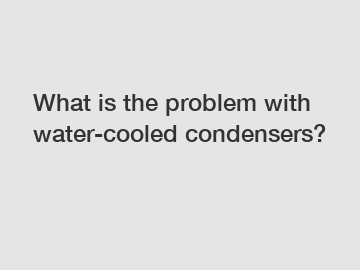What is the problem with water-cooled condensers?
You will get efficient and thoughtful service from Kendall.
Water-cooled condensers have long been used in various industries to remove heat from processes and systems. However, the problem with water-cooled condensers lies in their environmental impact. .
The main issue with water-cooled condensers is their high water consumption. These systems require a significant amount of water to operate efficiently, leading to potential strain on water resources, especially in areas with water scarcity. Additionally, the water used in the condenser can become contaminated with chemicals and pollutants from the process, posing a risk to the environment and human health if not properly treated before discharge.

Furthermore, water-cooled condensers can contribute to thermal pollution. The hot water discharged from the condenser back into water bodies can raise the temperature of the receiving water, leading to a decrease in oxygen levels and an increase in algae growth. This can disrupt aquatic ecosystems and harm aquatic life.
Additional reading:Is the Copeland Scroll Condensing Unit Overrated?
Revolutionizing Food Preservation: Is Cold Room Refrigeration A Game Changer?
Everything You Need to Know About Cold Room Refrigeration Units
Essential Tips for Safe Drug Cold Storage
Why water cooled screw chillers are essential?
5 Reasons Why Screw Type Compressor Condensing Units Excel
12 Ways To Save On Air Conditioning Costs
In response to these issues, alternative cooling technologies such as air-cooled condensers are being increasingly adopted. Air-cooled condensers eliminate the need for large amounts of water, reducing water consumption and the risk of contamination. Additionally, they do not discharge hot water back into water bodies, thus minimizing the potential for thermal pollution.
The shift towards more sustainable cooling technologies not only helps to protect water resources and the environment but also has economic benefits. By reducing water consumption and the need for water treatment, industries can lower their operating costs and improve their environmental footprint. Additionally, the adoption of air-cooled condensers can help companies comply with stricter environmental regulations regarding water usage and discharge.
In conclusion, the problem with water-cooled condensers lies in their environmental impact due to high water consumption and potential thermal pollution. By transitioning to alternative cooling technologies such as air-cooled condensers, industries can mitigate these issues and move towards a more sustainable and environmentally friendly operation. The shift towards more efficient cooling technologies not only benefits the environment but also helps companies reduce costs and improve compliance with environmental regulations.
For more bizter compressor condensing unitinformation, please contact us. We will provide professional answers.
Additional reading:5 Must-Have Features in a Animal Feed Processing Equipment
Why can the permanent magnet frequency conversion air ...
Steps of Start Flour Mill Business
Waste sorting
Automatic Pillow Bag Flow Packing Machine - SZ180 - Soontrue
Top 6 Gypsum Board Companies in the World
ZONESUN ZS-YTMP1S Magnetic Pump Liquid Filling ...









Comments
0